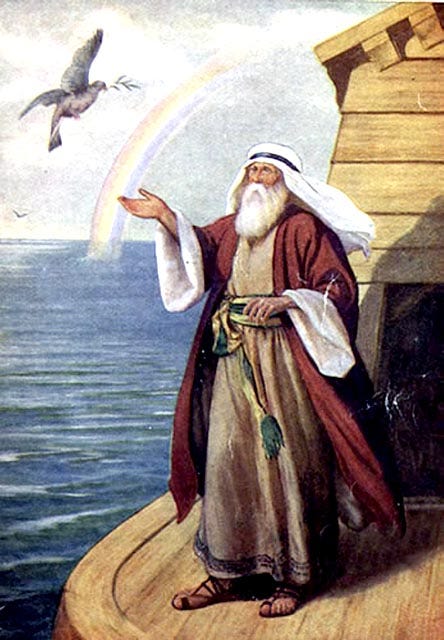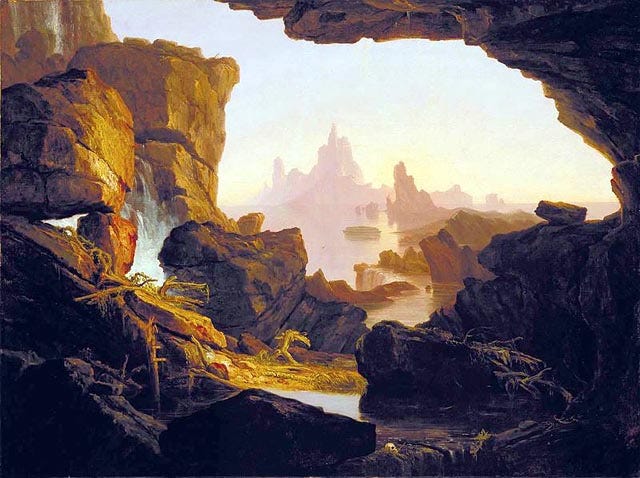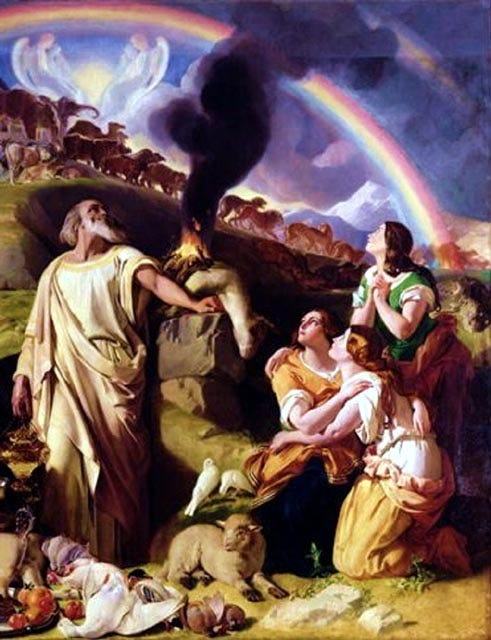Here we go again! Three mini-essays, and a text with footnotes, submitted for your thoughtful consideration. Today we continue that overly-familiar story about Noah and his little toy boat full of cute, lucky critters.

Noah and the dove and the asynchronous rainbow (Wikipedia)
How Long were Noah et al in the Ark? (8:1-8:13)
Back in the Lesson on Genesis 6, I boldly (and erroneously) asked the rhetorical question: "...how would you like to have lions, tigers, elephants, giraffes, cows, caribou, bison, buffalo, crocodiles, alligators, pythons, and so on in that much space for five months!"
I had misread this chapter, and subsequently misspoke. I had read in 8:3 that "after the end of the hundred and fifty days the waters were abated," and stopped there. But that was not the day of debarkation. As we see in this chapter, a lot of things happened after "the waters were abated," mostly things to do with birds.

"…he put forth his hand, and took her, and pulled her to him into the ark" from Foster Bible Pictures (Wikipedia)
So let me turn to a real expert (with whom I usually disagree theologically and even archaeologically, but he shorely knows what he's talking about text-wise), one Henry H. Halley, who wrote in a section entitled "Time in the Ark" in his venerable Halley's Bible Handbook (first published in 1924, and updated many times since--mine is the 24th edition, from 1965):
Noah went into the Ark 7 days before it began to rain (7:4, 10). It began to rain 17th day of 2nd month of Noah's 600th year (7:11). Rained 40 days (7:12). Waters prevailed 150 days (7:24; 8:3). Ark rested 17th day of 7th month (8:4). Removed Ark's Covering 1st day of 1st month of Noah's 601st year (8:13). Went out of Ark 27th day of 2nd month (8:14-19). In the Ark 1 year 17 days: 5 months floating, 7 months on mountain.

The Subsiding of the Waters of the Deluge (Thomas Cole, 1829) (Wikipedia)
So there it is. If you think carrying enough food for eight people and the-god-knows-how-many animals for 150 days would be tough, imagine having enough food for 382 days!
The Birds: The First Case of Plagiarism? (8:7-12)
I comment below on the use of a raven and a dove as tests of the world's habitability. However, I can't help but point out here the similarities between this story and that told in the ancient Mesopotamian Epic of Gilgamesh (mentioned in the Lesson on Chapter 6). As we read in the translation by Stephen Mitchell, Utnapishtim--the Noah figure--tells this version of the bird episode:
On Mount Nimush the ship ran aground, the mountain held it and would not release it. For six days and seven nights, the mountain would not release it. On the seventh day, I brought out a dove and set it free. The dove flew off, then flew back to the ship, because there was no place to land. I waited, then I brought out a swallow and set it free. The swallow flew off, then flew back to the ship, because there was no place to land. I waited, then I brought out a raven and set it free. The raven flew off, and because the water had receded, it found a branch, it sat there, it ate, it flew off and didn’t return.
Gilgamesh tells of three releases; the Bible, of four. Gilgamesh uses three birds, of three species; the Bible has two, of two. Interesting, I think, that the Bible's two are two of Gil's three.

Noah and the dove in a mosaic fragment (Wikipedia)
Now, a True Believer would say that the Epic of Gilgamesh was sort of the mangled, "Operator" version of the Bible's (remember the game where players whisper a sentence around a circle, and it comes out different?). The god told it true (like in the Bible), they claim, and it became corrupted in repetition.
I think it more likely that both were riffing on a local myth, the original source material of which has been lost. But in any case, the existence of this version (which was lost for centuries) does challenge the True Believers to account for the similarities.
The God Goes for Grub (8:21-22)
One of the mainstays of belief in the god is that he doesn't change; the New Testament's Epistle of James (my fave! for more than the obvious reason) calls him "the Father of lights, with whom there is no variation or shadow of turning."
But here it seems that all it takes to turn the god from being (a) one who kills off nearly every living thing because of human sin to (b) one who promises never to do it again, is the smell of something good cookin' on the barbecue.
Yeah, I know, pretty flippant, right? But how would you explain it?

Noah's sacrifice (Wikipedia)
Dr. Scofield, whose Reference Bible I labored over for many years, makes (IMO) a pretty huge leap when he suggests that since conscience--the system of "government" instituted when Adam and Eve were booted out of the Garden of Eden--failed, the god is here establishing a new system, that of human government. (Conscience and Human Government are two of the "dispensations" I introduced in my Footnote to Genesis 2:16-17, and elaborated on in the note to 3:23.)
So Scofield said:
The declaration of the Noahic Covenant subjects humanity to a new test. Its distinctive feature is the institution, for the first time, of human government--the government of man by man. The highest function of government is the judicial taking of life. All other governmental powers are implied in that. It follows that the third dispensation is distinctively that of human government. Man is responsible to govern the world for God. (emphasis mine)
Unpacking this a little, I think he derives from "the god won't kill again" the idea that "it's the humans' job to kill on his behalf"--e.g. capital punishment, slaughtering ungodly enemies, etc. Seems pretty shaky if you ask me.
--------
And now, Le Text et Le Footnotes.
The Text: The Rain Wanes (8:1-5)
8:1 And God remembered Noah, and every living thing, and all the cattle that was with him in the ark: and God caused a wind to pass over the earth, and the waters assuaged;
8:2 The fountains of the deep and the windows of heaven were stopped, and the rain from heaven was restrained;
8:3 And the waters continued to drain off the earth; after the end of the hundred and fifty days the waters were abated.
8:4 The ark rested in the seventh month, on the seventeenth day of the month, upon the mountains of Ararat.
8:5 And the waters decreased continually until the tenth month. In the tenth month, on the first day of the month, the tops of the mountains were seen.
8:3 after the end of the hundred and fifty days the waters were abated: see "How Long were Noah et al in the Ark?" above
8:4 The ark rested ... upon the mountains of Ararat: Note the plural here. This was not "Mount Ararat," which wasn't named such until the Middle Ages (so anyone searching that mountain for a giant wooden shoe box is likely to be disappointed). Rather, these were mountains in the region of Ararat (actually, it was called Urartu in Hebrew; "Ararat" is a Greekified version). Its own people called it the Kingdom of Van; there's still a lake there by that name: Lake Van. We call the region Armenia, a much later name.
8:5 the tops of the mountains were seen: Lest you have any doubt that this flood was extraordinary...
The Text: The Birds (8:6-12)
8:6 And it happened at the end of forty days that Noah opened the window of the ark he had made:
8:7 And he sent forth a raven, which went forth to and fro, until the waters were dried up from off the earth.
8:8 He also sent forth a dove, to see if the waters were abated from the face of the ground;
8:9 But the dove found no rest for the soles of her feet, and she returned to him in the ark, for the waters were [still] on the face of the whole earth, so he put forth his hand, and took her, and pulled her to him into the ark.
8:10 And he stayed another seven days; and again he sent the dove out of the ark;
8:11 And the dove came to him in the evening; and there in her mouth was an olive leaf she had plucked, so Noah knew that the waters were abated from the earth.
8:12 He stayed another seven days, and sent forth the dove [again], which did not return to him any more.
8:7 he sent forth a raven: The dove is clearly symbolic; but what does the raven mean? Is it because they're scavengers, and there was lots of dead flesh lying around? (Also: did he have a raven and a dove to spare? 'Cuz they didn't come back!) See the mini-essay "The Birds" above.
8:8 He also sent forth a dove: The symbolism here is clearer. Dr. Scofield suggests: "The raven and the dove have been thought to stand for the believer's two natures: the 'old man' [before salvation] satisfied with a world under judgment; the 'new man' finding satisfaction only in the things of the new creation." I have no idea where he gets this!
8:9 so he put forth his hand, and took her, and pulled her to him into the ark: Making her history's first homing pigeon.
8:11 there in her mouth was an olive leaf she had plucked, so Noah knew that the waters were abated from the earth: Why could this not have come from a floating branch? Hmmm...
8:12 [He] sent forth the dove [again], which did not return to him any more: And so, he concludes, it's time to jump ship. But what if she had simply met with an accident? I don't think Noah's method was terribly scientific!
The Text: Land, ho! (8:13-14)
8:13 In the six hundredth and first year, in the first month, the first day of the month, the waters were dried up from the earth, and Noah removed the covering of the ark, and looked, and saw that the face of the ground was dry.
8:14 And in the second month, on the seven and twentieth day of the month, the earth was dried.
8:13 Noah removed the covering of the ark: What is this "covering"? Not the window, which is already open; is that the door that the god had to close in 7:16? I'm confused.
8:14 And in the second month, on the seven and twentieth day of the month, the earth was dried: So much specificity! Did Noah keep a Day Runner or something?
The Text: An Exodus (8:15-19)
8:15 And God spoke to Noah, saying,
8:16 "Go out of the ark, you, and your wife, and your sons, and your sons' wives.
8:17 "Bring forth with you every living thing that is with you, of all flesh, whether birds or cattle, and of every creeping thing that creeps on the earth; that they may breed abundantly, and be fruitful, and multiply upon the earth."
8:18 And Noah went forth, with his sons, and his wife, and his sons' wives;
8:19 Every beast, every creeping thing, and every bird, and anything that creeps upon the earth, after their kinds, went out of the ark.
8:17 "Bring forth with you every living thing that is with you...": "...but try to keep the predators away from their prey."
The Text: The First Postdiluvian Sacrifice (8:20-22)
8:20 And Noah built an altar to the LORD; and took [one] of every clean beast, and of every clean bird, and offered burnt offerings on the altar.
8:21 And the LORD smelled a sweet aroma; and the LORD said in his heart, "I will not curse the ground again anymore because of man; for the imagination of man's heart is evil from his youth; neither will I smite every thing living again anymore, as I have done.
8:22 "While the earth remains, seedtime and harvest, cold and heat, summer and winter, and day and night shall not cease."
8:20 And Noah … offered burnt offerings on the altar: There seems to be some system of sacrifice, though it hasn't been recorded. I doubt he was just winging it!
8:21 And the LORD smelled a sweet aroma: see the mini-essay "The God Goes for Grub" above.
8:22 "While the earth remains, seedtime and harvest, cold and heat, summer and winter, and day and night shall not cease": Such poetry! Recited in the midst of such carnage!
--------
And that will be just about that. Next time, the god makes a promise, and Noah gets up to some shenanigans.
'Til soon!


